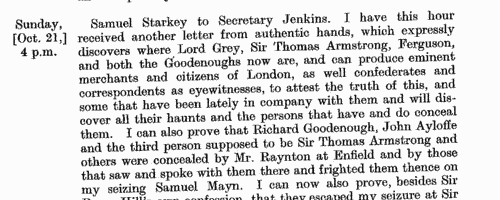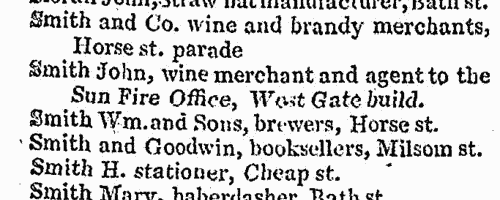Caw Surname Ancestry ResultsOur indexes 1000-1999 include entries for the spelling 'caw'. In the period you have requested, we have the following 50 records (displaying 1 to 10): Single Surname Subscription | | | Buying all 50 results of this search individually would cost £280.00. But you can have free access to all 50 records for a year, to view, to save and print, for £100. Save £180.00. More... |
These sample scans are from the original record. You will get scans of the full pages or articles where the surname you searched for has been found. Your web browser may prevent the sample windows from opening; in this case please change your browser settings to allow pop-up windows from this site. Official Papers
(1683-1684)
The State Papers Domestic cover all manner of business relating to Britain, Ireland and the colonies, conducted in the office of the Secretary of State as well as other miscellaneous records. This covers October 1683 to April 1684.CAW. Cost: £4.00.  | Sample scan, click to enlarge

|  Apprentices registered at Edinburgh
(1713-1715) Apprentices registered at Edinburgh
(1713-1715)
Apprenticeship indentures and clerks' articles were subject to a 6d or 12d per pound stamp duty: the registers of the payments usually give the master's trade, address, and occupation, and the apprentice's father's name and address, as well as details of the date and length of the apprenticeship. There are central registers for collections of the stamp duty in London, as well as returns from collectors in the provinces. There was a single collection for the whole of Scotland, made in Edinburgh. The sums collected are recorded in Scottish money, with conversion to sterling for transfer to London. A Scottish pund was worth 20 English pence. July 1713 to April 1715. (The sample entry shown on this scan is taken from a Norfolk return)CAW. Cost: £8.00.  | Sample scan, click to enlarge

|  Apprentices registered in Scotland
(1723-1726) Apprentices registered in Scotland
(1723-1726)
Apprenticeship indentures and clerks' articles were subject to a 6d or 12d per pound stamp duty: the registers of the payments usually give the master's trade, address, and occupation, and the apprentice's father's name and address, as well as details of the date and length of the apprenticeship. There are central registers for collections of the stamp duty in London, as well as returns from collectors in the provinces. There was a single collection for the whole of Scotland, made in Edinburgh. The sums collected are recorded in Scottish money, with conversion to sterling for transfer to London. A Scottish pund was worth 20 English pence. Because of the delay before some collectors made their returns, this register includes indentures and articles from as early as 1722. (The sample entry shown on this scan is taken from a Norfolk return)CAW. Cost: £8.00.  | Sample scan, click to enlarge

|  Masters of Apprentices registered in Scotland
(1723-1726) Masters of Apprentices registered in Scotland
(1723-1726)
Apprenticeship indentures and clerks' articles were subject to a 6d or 12d per pound stamp duty: the registers of the payments usually give the master's trade, address, and occupation, and the apprentice's father's name and address, as well as details of the date and length of the apprenticeship. There are central registers for collections of the stamp duty in London, as well as returns from collectors in the provinces. There was a single collection for the whole of Scotland, made in Edinburgh. The sums collected are recorded in Scottish money, with conversion to sterling for transfer to London. A Scottish pund was worth 20 English pence. Because of the delay before some collectors made their returns, this register includes indentures and articles from as early as 1722. (The sample entry shown on this scan is taken from a Norfolk return)CAW. Cost: £8.00.  | Sample scan, click to enlarge

|  Apprentices registered in Scotland
(1728-1731) Apprentices registered in Scotland
(1728-1731)
Apprenticeship indentures and clerks' articles were subject to a 6d or 12d per pound stamp duty: the registers of the payments usually give the master's trade, address, and occupation, and the apprentice's father's name and address, as well as details of the date and length of the apprenticeship. There are central registers for collections of the stamp duty in London, as well as returns from collectors in the provinces and from Scotland. The sums collected are recorded in Scottish money, with conversion to sterling for transfer to London. A Scottish pund was worth 20 English pence. (The sample entry shown on this scan is taken from a Norfolk return)CAW. Cost: £8.00.  | Sample scan, click to enlarge

|  Apprentices registered at Edinburgh in Scotland
(1750-1754) Apprentices registered at Edinburgh in Scotland
(1750-1754)
Apprenticeship indentures and clerks' articles were subject to a 6d or 12d per pound stamp duty: the registers of the payments usually give the master's trade, address, and occupation, and the apprentice's name, as well as details of the date and length of the apprenticeship. There are central registers for collections of the stamp duty in London, as well as returns from collectors in the provinces and from Scotland. (The sample entry shown on this scan is taken from a Norfolk return)CAW. Cost: £8.00.  | Sample scan, click to enlarge

|  Apprentices registered in Scotland
(1750-1754) Apprentices registered in Scotland
(1750-1754)
Apprenticeship indentures and clerks' articles were subject to a 6d or 12d per pound stamp duty: the registers of the payments usually give the master's trade, address, and occupation, and the apprentice's father's name and address, as well as details of the date and length of the apprenticeship. There are central registers for collections of the stamp duty in London, as well as returns from collectors in the provinces and from Scotland. (The sample entry shown on this scan is taken from a Norfolk return)CAW. Cost: £8.00.  | Sample scan, click to enlarge

|  Masters of apprentices registered in Scotland
(1772) Masters of apprentices registered in Scotland
(1772)
Apprenticeship indentures and clerks' articles were subject to a 6d or 12d per pound stamp duty: the registers of the payments usually give the master's trade, address, and occupation, and the apprentice's name, as well as details of the date and length of the apprenticeship. There are central registers for collections of the stamp duty in London, as well as returns from collectors in the provinces. These collectors generally received duty just from their own county, but sometimes from further afield. The indentures themselves can date from a year or two earlier than this return. (The sample entry shown on this scan is taken from a Bristol return. Each entry has two scans, the other being the facing page with the details of the indenture, length of service, and payment of duty.) IR 1/58CAW. Cost: £8.00.  | Sample scan, click to enlarge

| Deaths, Marriages, and Marine Accidents
(1802-1803)
Death notices and obituaries, marriage and birth notices, general news and marine accidents (usually naming the unfortunate captain), as reported in the Monthly Register and Encyclopedian Magazine. Includes some marriages and deaths from Ireland, Scotland and abroad.
CAW. Cost: £6.00.  | Sample scan, click to enlarge

| Inhabitants of Glasgow
(1805)
Holden's Triennial Directory of 1805 to 1807 included a provincial section, listing professional people and traders in England, Wales, Scotland and Ireland. (The sample scan here is from the listing for Bath)CAW. Cost: £6.00.  | Sample scan, click to enlarge

|
Research your ancestry, family history, genealogy and one-name study by direct access to original records and archives indexed by surname.
|













